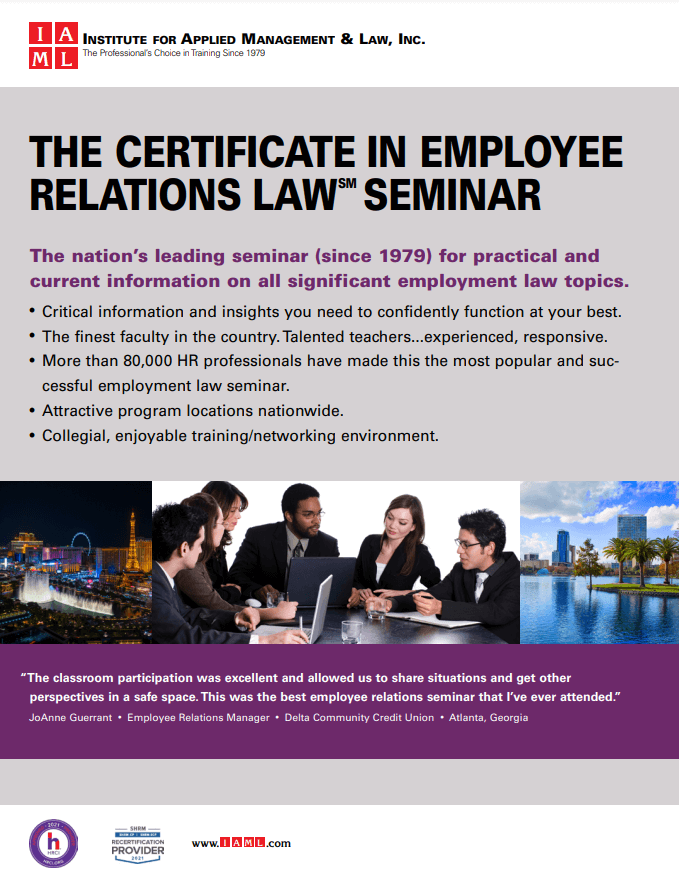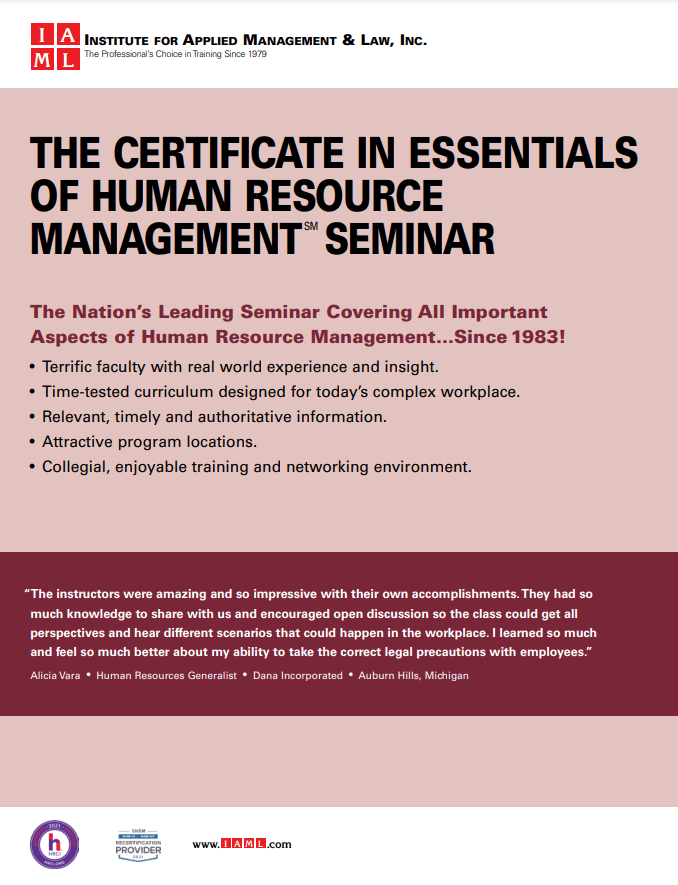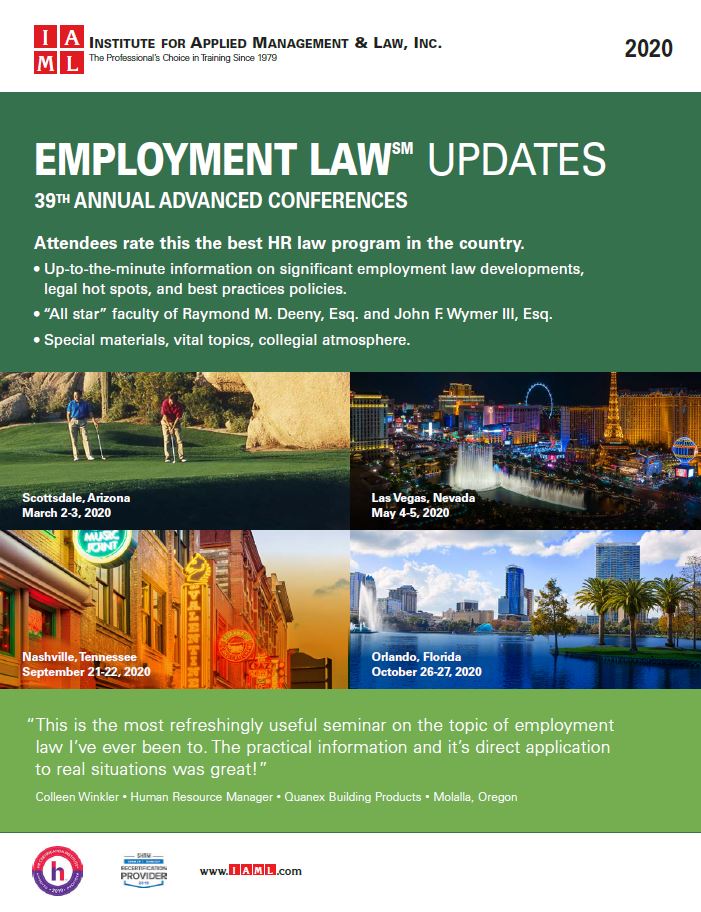HR Management Training Certificate Seminars
The Certificate in Employee Relations Law Seminar provides the most comprehensive, practical, up-to-date employment law training available. This is a 4½ day seminar is geared to the real-world needs of human resource professionals, attorneys, and managers. The seminar provides “best practices” insights and information on the full a wide range of employee relations and labor law issues.
The Certificate in Essentials of Human Resource Management Seminar provides comprehensive and practical coverage of many important aspects of human resource work. The objective of the program is to help participants who are new to the human resources field immediately become more effective on the job, while helping them prepare for greater responsibilities.
Do you know how to conduct a lawful workplace investigation? In addition to saving potentially millions of dollars in litigation costs and lost productivity, a lawfully conducted investigation can nip workplace problems in the bud; keeping businesses operating smoothly—and out of the courtroom.
Two days of hard-hitting, up-to-the-minute information on all significant employment law developments. Designed for experienced HR professionals and attorneys. Features superb faculty, important topics, and great networking opportunities. A not-to-be-missed conference! Participant favorite for decades!
PROGRAM DATES
HR Management Training
As with all continued learning programs, HR management certification by renowned institutions ensures HR managers are equipped with the knowledge to manage employees effectively in accordance with the law. Additionally, it maximizes worker performance to support a company’s strategic goals. With a focus on systems and rules, human resource management primarily deals with managing personnel and preventing hazards to assist your firm in achieving its goals.
In addition to evaluating goals, adhering to local, state, and federal requirements, and performing strategic duties like succession planning, human resources management also involve hiring, terminating, training, managing, and motivating employees.
By organizing, directing, and coordinating the administrative tasks and creating policies and procedures, HR Department essentially acts as a liaison between an organization’s management and its employees. Since the human resources management team oversees an organization’s training, coaching, administration, legal, and talent management, an oversight could have detrimental legal repercussions. As such, HR management certification is crucial in ensuring HR managers strategize, direct, and organize administrative employee functions according to labor law.
Functions of Human Resources Management
The goals of human resources management are to find qualified candidates, hire, train, and assist them in enhancing their performance to achieve their full potential and contribute to the organization’s objectives. Hiring accomplished candidates, nurturing their skills over time, and establishing a setting where they can collectively produce their best work are crucial in an organization’s growth.
The success of the company and its employees depends heavily on human resources management, regardless of the sector or size of the firm. Here are five roles that human resources management plays.
Recruitment and Hiring
Recruitment and hiring are two of the most well-known responsibilities in human resource management. To be competitive in their sector, businesses must accurately select and retain excellent employees.
In major corporations, HR managers often coordinate with the recruitment team to ensure only candidates who meet or exceed the education, experience, and abilities requirements are considered for the position. Additionally, the HR management team also considers personality attributes and working styles to ensure long-term compatibility.
A strategic HR division has a long-term hiring and recruiting strategy that supports the company’s expansion objectives.
Managing Ties Between Employees and Employers
Human resource management must concentrate on developing positive relationships among all levels of employees because a company’s success depends on its personnel.
This can involve settling disputes in heated circumstances or negotiating advantageous results for all parties concerned. It may also involve offering specialized training, such as mindfulness or anger management, to ensure that workers have the tools to control themselves in the workplace efficiently.
Onboarding and Ongoing Training and Development
It’s critical to properly onboard and train new personnel with the skills necessary to succeed. The onboarding process provided by human resource management for new hires may include communicating the company’s goal, vision, values, and internal policies and procedures.
Depending on the workplace, safety training could also be a part of it. To ensure that new hires have the skills essential to succeed in their professions, it is crucial to properly onboard and train them. The organization’s objective, mission, and values, as well as internal regulations and procedures, may all be discussed throughout the onboarding process that human resource management provides for new hires. Training on safety procedures may also be included, depending on the workplace.
Fostering a Positive Workplace Culture
Creating a vibrant corporate culture is one of human resource management’s most underutilized tasks. Employee morale-boosting activities don’t just occur at team lunches or after-work get-togethers. It takes place due to the company’s ethos, which includes its goal, vision, and core values.
Another HR duty is ensuring that employees receive fair compensation and tangible and intangible perks. To help the organization move in the correct direction, the department should identify any potential negative workplace culture issues that can cause employee concerns.
Managing Disciplinary Measures and Actions
Disciplining staff members when necessary is a challenging part of human resource management. A disciplinary procedure must be established, and HR personnel must ensure that every employee knows it at onboarding.
The HR team should ideally include a legal professional to ensure that the business complies with all applicable labor regulations regarding disciplinary proceedings. HR may need to provide the employee a written warning and put it in their file if something happens that calls for disciplinary action. Depending on the situation, it can even be necessary to suspend, downgrade, or dismiss the employee.
Meeting compliance requirements and industrial safety standards, preserving the accuracy of employee data, and supervising employee benefits are other duties under human resource management’s purview. Above all, the objective is to assist staff members in reaching their full performance potential to aid the firm in achieving its goals.
It can occasionally affect whether or not you get promoted. You’ll be in a competitive employment market, and having an HR certification gives you an advantage over those who don’t. It implies that you are knowledgeable, driven, and eager to advance in your industry.
An effective human resource management strategy is a valuable asset to any company. Still, those running small businesses often cannot justify designating a full-time HR professional to manage employee relations, compensation, policy-making, performance management, and employee appraisals.
This suite of courses will teach you the basics of managing the benefits and policies that support an effective staff. What does an employer need to know about anti-discrimination regulations? What are the key aspects of pay policies? How can employers avoid the traps of the employee selection process? In this suite of courses, you will discover the answers to these and other important questions.
HR Management Certificate in Employee Relations Law Seminar
The human resource certification in Employee Relations Law Seminar offers the most thorough, useful, and current employment law instruction. This four-and-a-half-day conference is designed with managers, lawyers, and human resource specialists. On the entire spectrum of employee relations and labor law concerns, the seminar offers “best practices” insights and knowledge.
Prominent employment law attorneys who are also exceptional presenters will lead the event. The emphasis is on how the law may be used in practice and what actions participants can take at work to deal with the intricate needs of the numerous laws and regulations.
2020 Employment Law Update – 39th Annual Advanced Conference
This conference explores the most important advancements in labor and employment law each year, fresh regulations, and new fashions. You will examine recent decisions made by the district, appellate, and the U.S. Supreme Court over two days. We’ll discuss the implications of such rulings and what employers must do to comply.
The 2020 Employment Law Update – 39th Annual Conference is intended for seasoned employee relations/human resources professionals and attorneys and offers excellent faculty, crucial topics, and fantastic peer networking opportunities. An event not to be missed!
HR Management Certificate in Essentials of Human Resource Management Seminar
Numerous significant facets of human resource work are covered in-depth and practically in the human resource certification in the Essentials of Human Resource Management Seminar. The program’s goal is to assist participants who are brand-new to the human resources industry in becoming more productive on the job right away while assisting them in getting ready for additional responsibility.
All instructional and reference materials are created to be used in regular business settings. Participants gain knowledge of the fundamentals of employment law, the design and planning of pay programs, important training methods for creating performance-based evaluation programs, HR decision metrics, and HR strategies.
HR Management Certificate in Conducting Lawful Workplace Investigations Seminar
A correctly handled inquiry can prevent millions of dollars in lawsuit fees and missed productivity while keeping firms running smoothly and out of court.
Making the appropriate choice frequently depends on how well the study was done. Decision-making is incorrect without the facts, and the employer may be liable heavily.
In this human resource certification, participants will acquire practical experience in interviewing witnesses and assessing evidence as they learn how to resolve complaints legally. Over two days, the attorney-instructor will walk you through the investigative process while providing crucial advice and suggestions. You will actively participate through role-playing in thorough, “real-time” investigations before being awarded this hr management certificate.
FAQs
What is the difference between the shrm-cp and shrm-scp designations?
No degree or prior HR experience is necessary for candidates to apply for the SHRM-CP hr management certificate. However, it is advised that they have a fundamental working knowledge of HR practices and principles.
The SHRM-CP test is meant to evaluate a candidate’s degree of expertise in an operational HR job. This level of work entails responsibilities like putting HR policy into practice, assisting routine HR tasks, or acting as a point of contact for stakeholders and personnel about HR.
The SHRM-SCP certification is for people who have worked in strategy level HR/HR-related roles for at least three years or those who have had the SHRM-CP human resource certification credential for at least three years are currently working in or transitioning to a strategic level capacity.
A degree and a title in HR are not prerequisites for candidates for the SHRM-SCP certification.
The SHRM-SCP hr management certificate evaluates a candidate’s degree of expertise in strategic HR work. At this level, tasks including creating HR policies and procedures, supervising the implementation of integrated HR operations, running a full HR business, or driving the alignment of HR strategies with company goals are all part of the job description. HR consultants can prove they have the necessary experience by performing HR/HR-related tasks for their clients.
What skills or experience do i need to already have, before starting to learn human resource management
The standard educational requirement for a management position in human resources is a bachelor’s degree. One can take numerous degree courses to enter the human resources industry. Several colleges offer degree programs centered on fundamental competencies linked to people practices in a company. To make sure a candidate is qualified for the role, some businesses may demand they have a master’s degree and several years of experience. Less frequently, a business may insist on candidates’ credentials from relevant organizations like the Society for Human Resource Management or the HR Certification Institute before evaluating them.
To become an HR manager, you need to:
1. Get your Bachelor’s Degree
Firms frequently require professionals in human resources to hold a bachelor’s degree. Degrees in business administration and human resources, such as a bachelor’s in human resource management, are appropriate for human resources managers.
2. Obtain Work Experience
You cannot become a human resource manager through education alone. The key is experience. Aim for an internship in the human resources division to understand everyday operations firsthand. An entry-level position in a bigger company is a good place to start your career. As soon as you can, start networking with the organization’s leadership.
You can design your career path and learn about the organizational culture with the assistance of a mentor. Decide on a specialty and master it. For instance, if encouraging staff motivation is a concern, create and suggest a rewards system. Before you realize it, a managerial position will be offered to you.
3. Get your Master’s Degree
Many human resources professions don’t require a master’s degree. Still, some HR professionals may find that a master’s degree helps them improve their leadership skills and advance their business knowledge, which may result in a higher income.
Skills Required to Become an HR Manager
People management encompasses the ability to handle a range of personalities, resolve conflicts, and coach others. People skills go hand in hand with excellent communication abilities. HRM experts can communicate both positive and negative news, such as hiring a new employee or firing an employee.
Like most careers, managing human resources requires the ability to multitask or work on multiple tasks simultaneously.
HR managers are responsible for ensuring that the company’s ethics guidelines are followed. Ethics is a notion that looks at a situation’s moral right and wrongs. Many HR managers must work with highly confidential information, such as payment information. A sense of ethics is crucial while handling this information.
What Specific Skills and Competencies Can One Expect to Gain from each certification?
HR Management Certificate in Employee Relations Law Seminar
The HR management certification in the Employee Relations Law Seminar aims to give participants a solid foundation of real-world experience in all areas of employment law. The seminar offers the following to attendees:
- Participants can expect to gain a deep understanding of a wide range of current employment laws and regulations. This includes both federal and state-level laws that impact the workplace.
- The seminar is designed to equip individuals with the ability to apply their knowledge of employment laws and regulations to real-world workplace situations. This means participants will learn how to navigate complex legal requirements in their day-to-day roles.
- Participants will develop the skills to recognize and address potential problems related to employee relations and labor law issues. This includes identifying situations that could lead to legal disputes and taking proactive measures to address them.
- The certification aims to provide strategies and policies to help organizations minimize their exposure to litigation. Participants will learn best practices for creating and implementing policies and procedures that comply with employment laws and reduce legal risks.
- Attendees will gain knowledge about how to ensure their organization’s practices are in compliance with current and expected future employment laws and regulations. This is crucial for avoiding legal issues and penalties.
- The seminar offers insights into anticipated future changes in employment laws and regulations. Participants will be better equipped to plan and adapt their organizations’ policies and practices accordingly.
- Participants will have the opportunity to network with fellow HR professionals, attorneys, and managers. Building these connections can be valuable for sharing knowledge and best practices in the field of employee relations and employment law.
- Dealing with employee relations and labor law issues often involves effective communication. Participants may enhance their communication skills, including the ability to convey complex legal concepts to non-legal colleagues.
- Participants may learn how to create and maintain the necessary documentation to demonstrate legal compliance, which is crucial in the event of audits or legal disputes.
- The seminar may include training on how to assess and prioritize risks related to employee relations and labor law, allowing organizations to allocate resources effectively.
Overall, this certification appears to provide a well-rounded education in employment law and employee relations, equipping participants with the knowledge and skills needed to navigate the complexities of the legal landscape while effectively managing workplace relationships and minimizing legal risks.
2020 Employment Law Update – 39th Annual Advanced Conference
You will better understand how to study and assess federal regulations relating to your firm’s requirements and how they affect upholding suitable working conditions and relationships, ensuring that your organization’s management and personnel policies and procedures adhere to these different laws.
What you should expect from this certification:
- Stay Informed: Get up-to-date knowledge on labor and employment law developments.
- Legal Insights: Review recent court decisions and understand their impact on employers.
- Alignment with Regulations: Learn how federal regulations relate to your organization’s needs.
- Policy Conformance: Ensure your policies align with employment regulations.
- Problem-Solving Skills: Develop analytical problem-solving abilities.
- Peer Networking: Connect with industry professionals for insights and experiences.
- Continuing Education: Stay current with legal trends and requirements.
Possess the capacity to address issues that require additional context and in-depth analytical thinking.
HR Management Certificate in Essentials of Human Resource Management Seminar
This HR management certification goal is to assist participants who are brand-new to the human resources industry in becoming more productive on the job right away while assisting them in getting ready for additional responsibility.
This certification provides the following skills and competencies:
- Participants will gain a strong understanding of employment laws and regulations, enabling them to navigate legal aspects of human resources effectively.
- The program covers the design and planning of compensation programs, helping participants create competitive and fair pay structures.
- Participants will learn key training techniques to develop effective performance-based evaluation programs, ensuring that employees receive the necessary training for success.
- The program equips participants with the ability to use data and metrics to make informed HR decisions, improving the strategic impact of their work.
- Participants will develop HR strategies that align with organizational goals and contribute to overall business success, preparing them for greater responsibilities in the field.
To sum up, this certification program enhances participants’ practical HR skills and knowledge, enabling them to excel in their roles and prepare for career advancement.
HR Management Certificate in Conducting Lawful Workplace Investigations Seminar
In this HR management certification, participants will acquire practical experience in interviewing witnesses and assessing evidence as they learn how to resolve complaints legally. Over two days, the attorney-instructor will walk you through the investigative process while providing crucial advice and suggestions. You will actively participate through role-playing in thorough, “real-time” investigations before being awarded this HR management certification.
Here’s a combined list of skills and competencies gained that participants will gain:
- Legal Compliance and Risk Mitigation
Understanding the legal framework and regulations governing workplace investigations.
Learning strategies to reduce organizational risks related to workplace investigations.
- Cost Reduction and Issue Identification
Emphasizing how well-conducted investigations can save organizations money.
Developing the ability to identify and address workplace issues proactively.
- Evidence Handling and Documentation
Gathering, evaluating, and preserving evidence effectively.
Creating comprehensive and legally sound documentation of the investigative process.
- Interviewing and Questioning Techniques
Practicing interviewing witnesses with effective questioning techniques.
Ensuring witness cooperation during the investigative process.
- Decision-Making and Reporting
Making informed and legally defensible decisions based on investigation findings.
Drafting thorough investigation reports and making recommendations for corrective actions.
- Practical Experience and Role-Playing
Gaining practical experience through role-playing exercises.
Applying learned skills and concepts in real-time investigative scenarios.
- Guidance and Ethical Considerations
Receiving guidance from an attorney-instructor throughout the investigatory process.
Addressing ethical considerations in workplace investigations to ensure fairness and integrity.
By participating in this certification program, individuals can acquire a comprehensive skill set for conducting lawful workplace investigations, covering legal compliance, cost-effective practices, evidence management, interviewing skills, decision-making, practical experience, and ethical awareness. These competencies are valuable for professionals responsible for handling workplace issues and investigations within their organizations.





